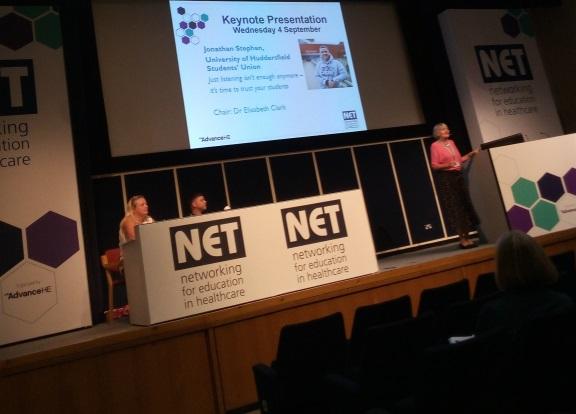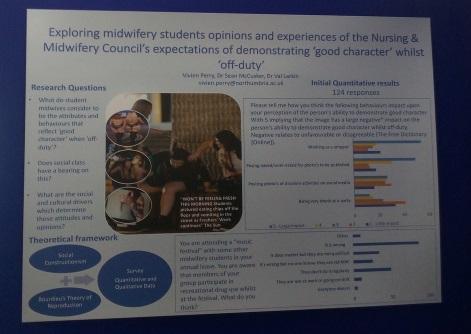Jonathan Stephen of Huddersfield Students’ Union (SU) introduced delegates to day two of NET with a thought-provoking keynote. This is the first time that a student has delivered a keynote at NET and it proved to be valuable for both academics and myself as a student. Jonathan focussed heavily on trusting in students and student leaders in higher education institutes (HEI) and highlighted the importance of the academic community between students and staff.

Partnership working and educational enhancement have been two of the themes during this conference and so Jonathan’s keynote was a good way of touching base with how beneficial collaboration between staff and students in HEIs can be. He talked about Huddersfield SU’s work on the black and minority ethnic (BAME) attainment gap that has paved the way for other Student Unions to look at their own curriculum and how inclusive they are, developing roles for BAME students to act as ambassadors for their colleagues/peers. This keynote raised questions about correlations between the National Student Survey (NSS), Teaching Excellence Framework (TEF), Research Excellence Frameworks (REF) and QS World Rankings results.
Jonathan’s talk made me reflect on the work that Northumbria SU, where I’ve held extra-curricular roles, has done since being hosted by Huddersfield University SU in 2018. Our academic and equality representatives are in a fortunate position to be hosted by senior management once a month during the academic year to provide feedback and raise issues that are affecting their peers and colleagues, and as a result of this, Northumbria University, in partnership with Northumbria SU have made the BAME attainment gap a priority campaign and we anticipate further research and results from this.
The first poster session of the day provided some excellent research done by academics and students. Two of those students are second year learning disability nurses (LDNs), Paula and Chris, who are transitioning into their third year. As first-time presenters at this conference they educated delegates on the LDNs role in the assessment and promotion of acute physical healthcare within the community.

My other highlights from this session included Iwan Dowie of the University of South Wales’ poster on co-production of the new Nursing and Midwifery Council’s (NMC) curriculum with students as full partners. Vivien Perry of Northumbria University delivered her initial research findings on midwifery students’ experiences and opinions of the NMC’s expectations of demonstrating professional ‘good character’ whilst ‘off-duty’ and if social class influences this.
Having attended two themed sessions on day one about student engagement and experience, on day two I attended a session which covered the development of the future healthcare education workforce and gained some further insight into the role of nursing apprentices and how they are educated. Wendy Parry, another student from Northumbria University presented alongside Dr Debra Porteous and Dr Julie Derbyshire and offered first hand experience into transitioning from working in a local Trust to undertaking the new degree apprenticeship programme. This study is ongoing and will eventually inform the future degree apprenticeship programmes and the nurse education agenda. A good discussion from delegates ensued about the costs, barriers and benefits of this new programme.
Opting for insight into a different theme of the conference in the afternoon, I attended a session on education in clinical practice and practice development and was hugely impressed by the presentations in the two-hour slot. Very recently I was allocated to a placement area which had adopted a model of coaching whereby student nurses were facilitated by a registered nurse to collaborate and learn from each other, delegating and prioritising patient care, and it was interesting for me to see research that had been done at both the University of Plymouth and Bournemouth University around Collaborative Learning in Practice (CLiP). The initial findings and feedback from students echoed the positive experience I had during my spoke placement where I coached two undergraduate mental health nurses. I developed confidence in my leadership and management abilities and felt prepared to transition into the third year of my studies.
The main thing I have taken from today is how invested HEIs are in the development and enhancement of clinical education and practice, and how willing the staff in these institutions are to collaborate with students to implement changes in the way we educate our future healthcare graduates. I feel very fortunate myself to be in an HEI where I am encouraged to collaborate with senior staff and academics to enhance education and practice and am made to feel a valuable member of their team.
Kayleigh McElderry-Wilkinson is an undergraduate Adult Nurse at Northumbria University. She is former lead representative for the HLS Faculty at the university and President of the IPL Society at Northumbria Students’ Union. Follow @KMWilkinsonStN on Twitter
Find out more about our upcoming conferences and submit your paper for NET 2020 here.